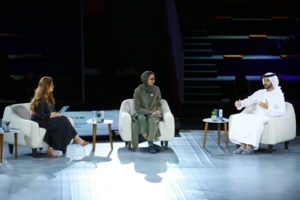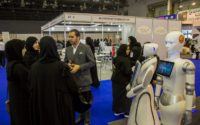HE Mohamed Khalifa Al Mubarak Reinforces The Creative Economy’s Essential Role In Global Prosperity At World Conference On Creative Economy (WCCE 2021)
HE Mohamed Khalifa Al Mubarak, Chairman, Department of Culture and Tourism Abu Dhabi has contributed to the World Conference on Creative Economy (WCCE 2021), by reinforcing the creative economy’s essential role in global prosperity and the very human foundations required for the Cultural and Creative Industries (CCI).
In his solo address, HE discussed the UAE’s newly launched CCI strategy. The 10-year National Strategy for the CCI, the first in the Arab world, was launched by HH Sheikh Mohammed bin Rashid, Vice President of the UAE and the Ruler of Dubai on 29 November 2021.
HE Mohamed Khalifa Al Mubarak, said: “Sustainable and inclusive economic growth is stimulated by innovation and fosters a more integrated and diverse society, creating opportunities and encouraging co-operation and cross-pollination across practices and experiences.
“Looking ahead to the next 50 years of development in the UAE, we are rapidly moving towards a fully diversified economic structure, built around knowledge-driven industries like technology, education and of course the culture and creative industries This investment is vital for the diversification of the UAE economy and for strengthening an ecosystem of innovation.”
The launch of the UAE’s National CCI Strategy was discussed in further detail in a dedicated session featuring HE Noura bint Mohammed Al Kaabi, Minister of Culture & Youth, UAE and HE Abdulla Bin Touq Al Marri, Minister of Economy, UAE who focused on the importance of the creative economy, supporting SME’s, freelancers and Individual creators, and nurturing talent and creativity from an early age.
HE Noura Bint Mohammed Al Kaabi, Minister of Culture & Youth, UAEdescribed how the first step to developing the creative economy is inculcating creative thinking: “We have to nurture creativity from a young age and encourage children to pursue their talents. The point we need to make here is that your creative pursuits are not simply hobbies but a potential source of livelihood. We need to infuse that confidence in our society, in parents whose children want to pursue art, music, filmmaking and so that these are potential career options.”
Focusing on the topic of protection for creatives, HE Abdulla Bin Touq Al Marri, Minister of Economy, UAE, explained how the Ministry of Economy, in cooperation with World Intellectual Property Organization (WIPO), is working to develop legislation and mechanisms that protect intellectual properly. His Excellency cited a new law decree regarding copyright in line with the Madrid Protocol which aims to provide protection for the author’s intellectual works in several areas such as collective management of copies and music.
Other highlights from day two of WCCE 2021 include a sofa session with HH Sheikha Latifa bint Mohammed bin Rashid Al Maktoum, Chairperson of Dubai Culture and Arts Authority, a member of Dubai Council, moderated by Becky Anderson, Managing Editor of CNN Abu Dhabi,under the theme, ‘Accessible Creativity’. The session explored the region’s creative potential, growth and opportunities for collaboration, discussing how greater accessibility into the creative economy can be achieved, locally and regionally – with a perspective on why seeking careers within creative economy is beneficial.
Her Highness commented: “Creativity has had a special place in my heart from a young age and I have always been taught to embrace challenges. It’s why I’m so proud to have a role working within the cultural and creative industry, particularly as we emerge from the Covid-19 pandemic. A recently launched initiative which allows creatives to acquire a license in just seven minutes is just one of many examples of how the UAE is helping its cultural and creative industries grow and thrive.”
Taking part in the conference was also Laura Zucker, Director, Center for Business & Management of the Arts, Claremont Graduate University, who moderated the session‘Rebuilding Economies with Imagination’. The featured speakers included Christopher Deacon, President and Chief Executive Officer, National Arts Center, Taoufik Aboudia, CEO, Emerging Business Factory, and Anthony Sargent, CBE, International Cultural Advisorexplored the effect of the pandemic on the creative economy across various global markets, including Canada, Morocco and UK.
During a session entitled ‘Creativity is Getting Social’ featuring Eytan Oren, CEO of Block Party, audiences heard how the popular app is enabling the use of social media to build brands and reach audiences as the landscape continues to grow and evolve. During this session Eytan focused on TikTok, Clubhouse, and The New Rules of Audio Marketing.
WCCE 2021 is focusing on six themes that collectively define the future of the global creative economy including: Education Unleashed, Reworking Work, Technology Transformation, Elevating the Media & Communications Landscape, Future Sustainable, and Inclusivity & Diversity.
Spanning three days, the conference is hosting an array of global talent across the various sectors of the Cultural and Creative Industries and featuring over 60 sessions of powerful keynote speeches, live and virtual panels, individual talks, in-person performances, exhibitions, and masterclasses.
There are limited spaces available for the third and final day of the conference, where the line-up includes Malcolm Gladwell, Author of five New York Times bestsellers, Journalist & Public Speaker/Podcaster; John Howkins, Global Strategist and Author; John Newbigin, OBE, founder and first Chairman of Creative England; Nadine Ghaffar, Founder & General Manager, Art D’Égypte, among other leading speakers.
There is no fee to attend WCCE as an in-person or virtual attendee, but pre-registration Is required as places are limited. To register and for more information about the conference and the schedule, please visit the WCCE’s digital platform www.wcce.ae.








 Email: info@cyber-gear.com
Email: info@cyber-gear.com